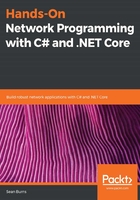
Writing for open communication
When we talk about open communication on networks, we're talking about collaboration between different devices or software components. This collaboration puts some responsibility on every developer who intends to leverage the resources of another; the responsibility to agree upon some standard for communication, and to respond according to that agreed upon standard. There may be a functionally infinite number of ways to format data to send and receive over a pipe, but unless someone else on the network has agreed to receive your data in the format you've decided to send it, none of it can be considered valid. You are, essentially, screaming into the void.
The broad range of possibility creates a need for standardization that is met by an equally broad number of organizations, including the World Wide Web Consortium (W3C) and the International Standards Organization (ISO). What this means for you is that you will ultimately be responsible for understanding what standards your software should adhere to in order to meet the functional requirements of your projects, and to provide the most value to other users of your product. Common standards you'll learn about in this book include communication protocols, such as TCP, UDP, and HTTP, as well as addressing and naming standards such as the IP addressing standard and the domain naming system.